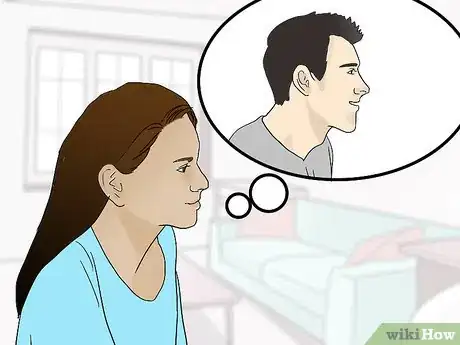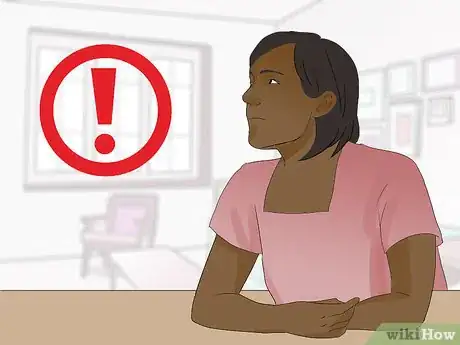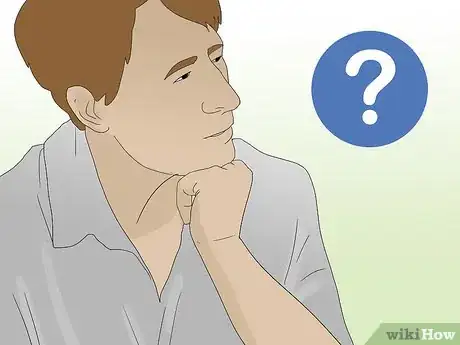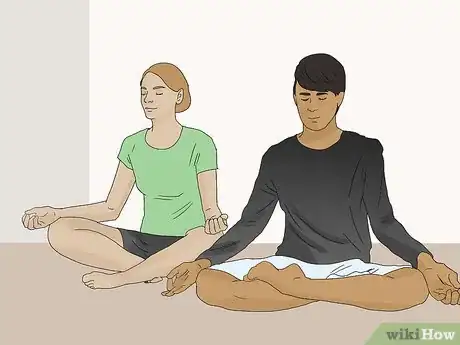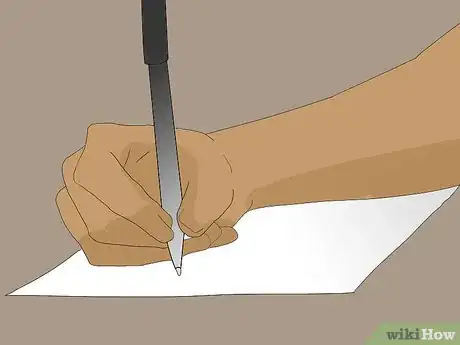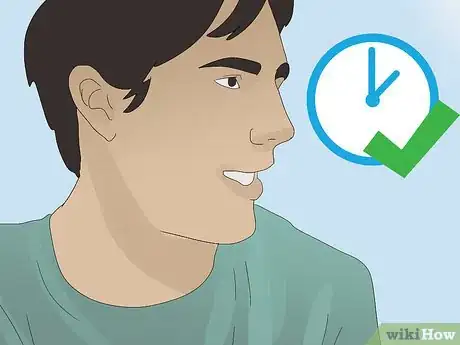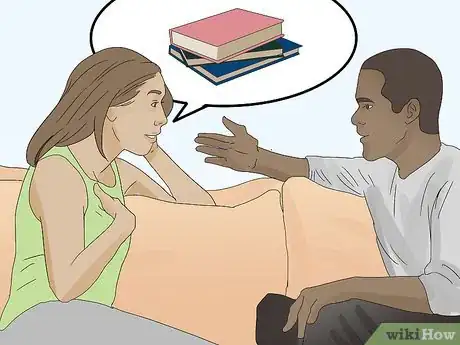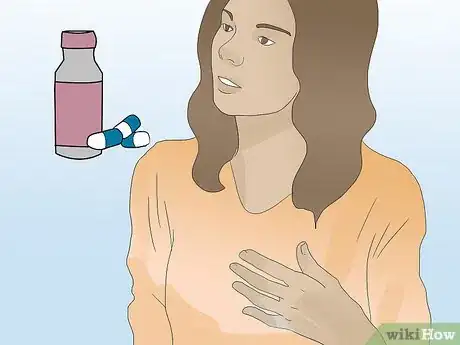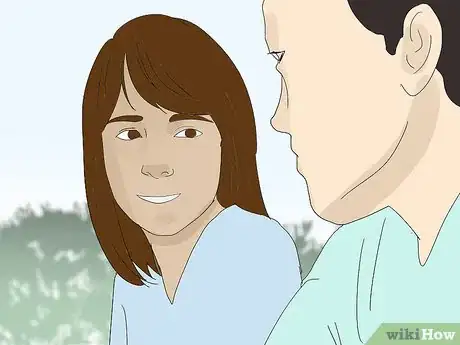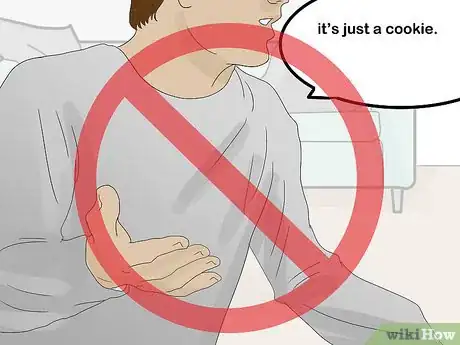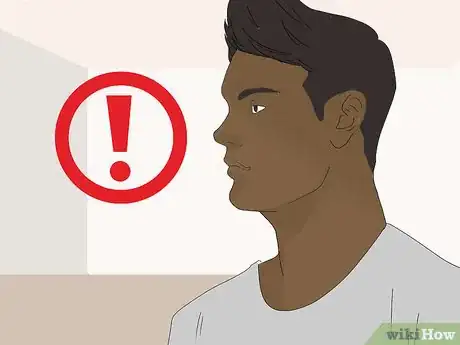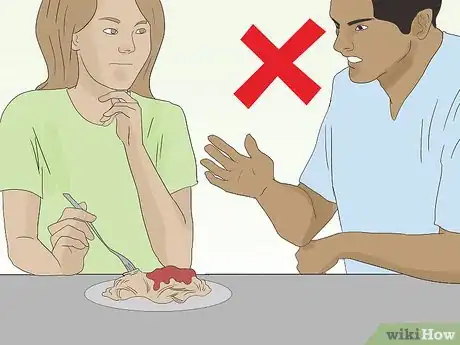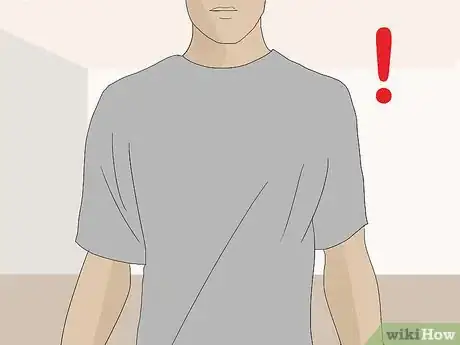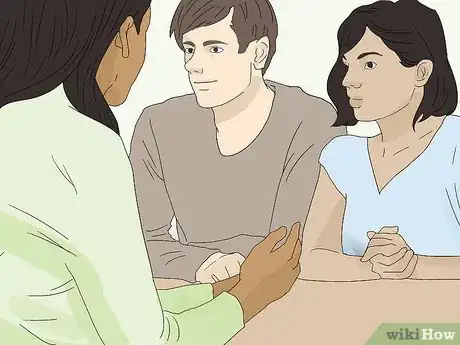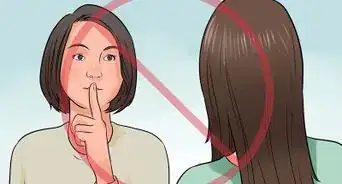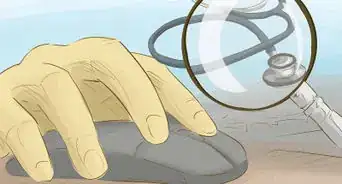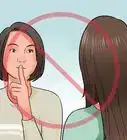This article was co-authored by Mindy Lu, LMHC, CN. Mindy Lu is a Certified Nutritionist (CN), Licensed Mental Health Counselor (LMHC), and the Clinical Director of Sunrise Nutrition, a nutrition and therapy group practice in Seattle, Washington. Mindy specializes in eating disorders, body image concerns, and chronic dieting. She holds an MS in Nutrition and Clinical Health Psychology from Bastyr University. Mindy is a Licensed Counselor and Nutritionist and is known for her warm therapeutic style and culturally-inclusive lens in healing. She is a member of the Multicultural Counselors of Washington State and the Association for Size Diversity and Health.
There are 7 references cited in this article, which can be found at the bottom of the page.
This article has been viewed 29,934 times.
Recovering from an eating disorder can be a difficult journey. Admitting to your partner that you have an eating disorder may bring up feelings of inadequacy, shame, or guilt. However, your partner may be a great source of strength and support. To tell your partner, prepare for it by deciding if your partner is supportive and preparing for all reactions. Then, figure out what you want to say, choose a good time to tell them, and be honest about your needs. Learn how to tell your partner about your eating disorder so you can be more open and honest in your relationship.
Steps
Deciding to Tell Your Partner
-
1Decide if your partner is supportive and understanding. Admitting that you have an eating disorder and deciding to tell your partner can be an extremely difficult process. You may feel embarrassed, guilty, or ashamed of your actions and your condition. As you make the choice to tell your partner, decide if you trust them and if they will support you and understand your struggle.[1]
- You need someone who will be there for you when you have difficulties, who can offer a shoulder to cry on or a listening ear, and who will not trigger you by obsessively talking about food or constantly ridiculing you.
-
2Decide what to share. You may not want to tell your partner everything about your eating disorder right away. You may want to just tell them the basics, like the type of eating disorder that you have and what your treatment is. Decide what you feel comfortable sharing.
- For example, you may not want to share all of your unhealthy habits or your health problems just yet. You may decide to share some health problems but keep some of your feelings and anxieties to yourself.
Advertisement -
3Prepare for any reaction. Your partner will react to this new knowledge when you tell them. They may have a lot of different reactions. Your partner may be shocked, upset, concerned, sad, angry, or relieved. The news may be distressing to hear. You should prepare for your partner to have a range of emotions, including negative ones.[2]
- Just because your partner has a negative reaction at the beginning doesn’t mean that they won’t be supportive or understanding. This news may be a lot for them to take in, so give them time to process and come to terms with your condition.
- For example, your partner may say, "I don't understand. You look great! I don't think you have an eating disorder" or "But you're working on losing weight and you're almost to your goal. That's not an eating disorder."
-
4Think about your needs. Telling your partner about your eating disorder will probably be very stressful for you. You may feel a lot of emotions afterwards, even if the reaction is a positive one. Remember that regardless of your partner’s response, you have to stay focused on you and your recovery. Continue to take care of yourself, follow your treatment plan, and focus on healing.[3]
- If your partner is unable to accept the news, makes you feel bad about yourself, or treats you negatively because of your eating disorder, talk to them about that. You may even go to counseling to try to work out the issues.
- Say, "I understand your feelings. However, your negative comments about my body and my condition hurts me and is not good for my recovery. Can we talk about resolving this so we can communicate in a healthier way?"
- If your partner is unwilling to accept your condition, uses unhealthy or abusive language, or treats you in an unhealthy way, you may need to reconsider the relationship. Your health and recovery comes first.
Explaining Your Condition
-
1Plan a relaxing activity for after you tell your partner. Telling your partner about your eating disorder may be stressful for you, so it is important to have a destressing activity planned for after. Try planning something that is not food related, such as going to see a movie with a friend, going for a massage or pedicure, or doing some yoga or meditation.
-
2Write down what you want to say. Before you tell your partner, you may want to write down some thoughts. This can help you organize what you want to say and take some of the pressure off when you finally tell them. You may want to write out a speech, jot down bullet points of things you want to say, or make a list of keywords so you won’t forget.[4]
- If you don’t think you can tell them in person, you may want to write them a letter.
- Consider asking a friend or family member who knows about your condition for help coming up with what to say. You may also want to consult your therapist for help in how to tell your partner.
-
3Choose the right time and place. When you tell your partner about your eating disorder, make sure to choose a good time and place to do it. Pick a time when both of you are not distracted and have time to have a long conversation. Do it in a quiet, private place instead of a public place.[5]
- You want to make sure cell phones are put away, television is off, and any other distractions are not going to interrupt you.
- Make sure you have plenty of time to talk because your partner may have a lot of questions.
- Tell your partner, "I have something very important to discuss with you. When do you have time to talk?"
- You may also want to prepare your partner for an empathetic, accepting response. Try saying something like, "I'm nervous about telling you this and I'm fearful of being judged. I trust you and want to share this with you."
-
4Detail your triggers. You should tell your partner about your triggers. If you are going to spending the majority of your time with them, they need to know how not to cause you to feel bad, get upset, or relapse. Be as detailed and honest about your triggers as you can, no matter how nervous, embarrassed, or guilty it makes you feel.[6]
- For example, tell your partner not to discuss diets, calories, or losing weight around you. You can say, "Focusing on the calories in food is a trigger for me. Can we not talk about calories and instead work on eating?"
- Point out any trigger foods or trigger situations. You may not be able to keep cookies in the house, or you may not be able to go to buffets or eat in social settings.
-
5Provide information about eating disorders. When you tell your partner about your eating disorder, you should have information ready for them to look over. They may not know that there are different types of eating disorders or that it is a mental illness. They may only have seen eating disorders in the media. Gather books, websites, and materials from your doctor about your eating disorder so your partner can educate themselves.[7]
- You may want to start with The National Eating Disorders Association, The National Eating Disorder Information Centre, and Eating Disorder Hope.
-
6Explain your treatment. When you tell your partner about your eating disorder, you should also tell them about your treatment and recovery. Tell them if you have been to rehab or if you are on medication. Explain any therapy that you are in and what your doctor, therapist, nutritionist, or other health professionals are doing to help you.[8]
- If you are not in treatment yet, tell them what you plan on doing to start the recovery process.
- Tell your partner, "I am undergoing treatment for my eating disorder. These are the steps I have taken to get to where I am, and this is how I manage it."
-
7Assure them they don’t need to fix you. One of the things you may want to communicate to your partner is that it is not their responsibility to fix you. You are not telling them so they can cure you or be responsible for your recovery. You only need their support and their understanding.[9]
- For example, you may say, “I know you want to help me get better. You can’t cure me. The way you can help is to be there for me, understand my condition, and meet my needs.”
Communicating Your Needs
-
1Build intimacy. Eating disorders can have a negative impact on your sexual intimacy. Eating disorders can reduce sex hormones, and your negative relationship with your body may make it difficult to enjoy intimate activities. Tell your partner you want to build the intimacy in your relationship. Let them know your boundaries and what they can do to help make you feel comfortable as you work through it.[10] [11]
- For example, you may explain that you don’t feel comfortable being touched or being naked with another person. Instead, you can tell them that you want to start with hand-holding, cuddling, and kissing. Tell them which parts of your body you feel comfortable with them touching and move forward from there.
-
2Explain that advice and compliments won’t help. Your partner may think that they can help you feel better about yourself by either offering advice or complimenting you. Your partner means well, but you should explain that advice and compliments won’t help you. It’s not that you feel bad about yourself, but a serious mental illness.[12]
- For example, you should tell your partner that saying things like “Why are you having trouble eating? I think you look amazing” doesn’t erase the fear or impulse.
- Also explain that trying to help you by giving advice or trying to help you realize that eating food isn’t a big deal doesn’t help you. Tell them not to say things like, “Come on, it’s just a cookie. It’s not going to kill you.”
-
3Ask your partner not to be dismissive. Though most mental illnesses are taken seriously, some people think eating disorders are only people wanting attention, people who want to be thin, or people who should just learn to portion control. However, eating disorders are serious mental illnesses. Ask your partner to take your eating disorder seriously and not to treat it lightly.[13]
- Let your partner know you feel bad when they are dismissive of your feelings and struggles because it is a big deal to you.
- For example, tell your partner not to say things like, “It’s just food. What’s the big deal?” or “I can’t believe you get this upset over a small cookie!”
-
4Tell your partner not to police your food habits. Your partner may think that to help you, they should watch what you eat closely. This means keeping tabs on how much food is in the house and watching how much food you consume in a meal. However, this hurts more than helps because it leads to feelings of guilt and shame, which can lead to destructive behavior.[14]
- Ask your partner not to comment about your eating habits. It may trigger you into unhealthy behavior.
- Tell your partner to let you know if they see serious or harming behavior, and to help you get help from your doctor if that is the case.
- Say, “I know you may want to help me with my eating by encouraging me to eat/not binge, but that only makes me feel guilty, ashamed, and like I’m not good enough.”
-
5Ask your partner not to focus on your body. Focusing on your body can be harmful for you, and comments about your body, good or bad, may be triggering. Ask your partner not to put the focus on your body or physical appearance. Instead, ask your partner to accept you for who you are at this moment, regardless of how your body looks.
- You may want to suggest that your partner be mindful of objecting other people’s bodies as well.
- Tell your partner never to tell you to lose weight or make negative remarks about your body. This could be very damaging for you.
- Suggest that your partner accept their body. If they are dieting, starting a new workout plan, or unhappy with the way they look, ask them to limit that kind of talk about you.
- Tell your partner, “It triggers me whenever I hear you talk about my body/your body, even if it’s a positive thing. Can we focus on other characteristics instead of the physical?”
-
6Suggest counseling. If your partner is struggling coming to terms with your condition, you may suggest that the two of you go to couples counseling. You may ask your partner to consider going to counseling to learn more about eating disorders, how to support someone with an eating disorder, and learn more about the disorder and coping process.[15]
- There are support groups for people with eating disorders, such as Overeaters Anonymous or Anorexia and Bulimia Anonymous. There also may be groups for the families of people with eating disorders in your area. Talk to your doctor, therapist, or local hospital about what’s available in your area.
References
- ↑ http://www.mirror-mirror.org/telling.htm
- ↑ http://www.eatingdisordersrecoverytoday.com/using-your-voice-telling-someone-you-have-an-eating-disorder/
- ↑ http://www.eatingdisordersrecoverytoday.com/using-your-voice-telling-someone-you-have-an-eating-disorder/
- ↑ http://www.mirror-mirror.org/telling.htm
- ↑ http://bingeeatingtherapy.com/2015/08/how-do-i-tell-my-husband-about-my-eating-disorder/
- ↑ http://bingeeatingtherapy.com/2015/08/how-do-i-tell-my-husband-about-my-eating-disorder/
- ↑ http://www.mirror-mirror.org/telling.htm
- ↑ http://www.helpguide.org/articles/eating-disorders/helping-someone-with-an-eating-disorder.htm
- ↑ http://bingeeatingtherapy.com/2015/08/how-do-i-tell-my-husband-about-my-eating-disorder/
- ↑ Mindy Lu, LMHC, CN. Certified Nutritionist & Licensed Counselor. Expert Interview. 21 October 2020.
- ↑ http://nedic.ca/me-my-partner-and-eating-disorder
- ↑ http://everydayfeminism.com/2015/03/5-ways-to-be-an-ally-to-your-partners-eating-disorder-recovery-and-avoid-triggering-them/
- ↑ http://everydayfeminism.com/2015/03/5-ways-to-be-an-ally-to-your-partners-eating-disorder-recovery-and-avoid-triggering-them/
- ↑ http://bingeeatingtherapy.com/2015/08/how-do-i-tell-my-husband-about-my-eating-disorder/
- ↑ http://www.helpguide.org/articles/eating-disorders/helping-someone-with-an-eating-disorder.htm
